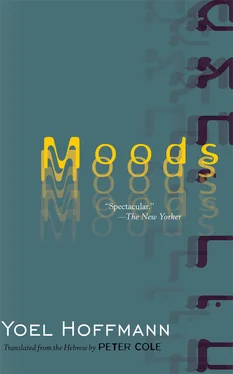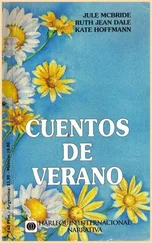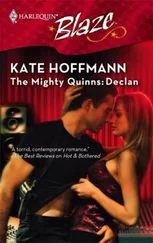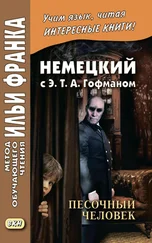We remember that Uncle Shamu once held a fountain pen up to the sun and with his other hand pointed to the nib and said: See, it’s gold.
[135]
Since we’ve thought of Uncle Shamu we’ve also thought of Dr. Kalish, who’d say the words “as well” ( und auch ) for no reason at all.
Dr. Kalish was a doctor of the humanities. He’d studied ancient history, or something like it, at the University of Leipzig and came to Palestine with Dr. Zoltan Forschner (who was a medical doctor), my Aunt Edith’s husband.
Why are we mentioning all these things? Because when the Italians bombed Tel Aviv (during the second world war) Dr. Kalish’s house was cut in two and Dr. Kalish and his wife (Frau Dr. Kalish) were exposed to the world as they were sitting at the kitchen table and eating an omelet.
During that same bombardment many people died, but Dr. Kalish and his wife were brought down on a ladder from the third floor, and from there they took a taxi to my Aunt Edith and her husband Zoltan, and they stayed with them (in their other room) for something like half a year.
[136]
We were six or seven then, and now can confess that we’d go to my Aunt Edith’s apartment (five buildings away) only to hear Dr. Kalish say und auch (as well).
He’d say, for instance, “Where is the skillet und auch,” or “What time is it und auch,” or “The Germans are retreating und auch,” or “Emma”—this was Frau Dr. Kalish’s name—“come here please und auch,” and so on.
For days (no, weeks and months) we’d think about what this und auch meant. That is, we realized that Dr. Kalish saw much more than other people did, but we didn’t know what he saw.
Once we plucked up our courage and we too said und auch (something along the lines of “What does it say in this book und auch ”), but Dr. Kalish just looked at us, surprised.
Today we think it should be mandatory, by law, for all people to use this expression at the end of every sentence. So as not to get too smug.
[137]
There’s someone else we wanted to talk about but we’ve forgotten his name and how he looks.
We remember only the other things. That he was a body’s length from the earth’s surface. That he came near and grew distant. That night came over him and the day made him bright, and things of this sort.
We can’t recall anyone more precisely. Therefore we miss him, and because we can’t remember his name, our longing is greater than we can say.
This person is with us wherever we go, and without him we’d die of a broken heart. And if this seems overly clever to someone, then maybe he should look at himself.
This man is also the hero of this book that we’re writing (and of all the books that we’ve written to date). If we could bring him to mind, we wouldn’t need to write.
[138]
We’ve already discussed Japan in this book. Here we simply want to mention the two distinguished prostitutes from Kyoto.
The first bowed deeply and said: We welcome you under our meager roof. We’re honored that you’ve chosen this lowly establishment. With the greatest possible humility we would like to begin by playing the samisen for you, and to the sound of its music a maiko (young geisha), who goes by the name of Rose’s Scent, will dance before you an ancient dance of desire. Ten thousand yen.
The second bowed more deeply still and said: Of late the autumn wind has blown, and the maple leaves are turning red. Within our humble rooms you can meet Cherry Blossom, who is, it’s true, thirty-six, but full of tricks, or Drawn Sword, who can bend herself, for your distinguished pleasure, in all four directions. Twenty thousand yen. And Lotus Flower, about whom you’ve no doubt heard, is thirty.
[139]
Cherry Blossom took off her obi but didn’t remove her kimono. She bowed deeply and said: Mr. Gaijin (Mister Foreign Man). Does Japan please you? Have you seen the rock garden at Ryoanji? Or the great statue of the Buddha at Nara? Does Mr. Gaijin know that it’s possible to crawl through his nostrils?
Yes. Cherry Blossom lives in Kyoto. Cherry Blossom’s mother was also a geisha. Cherry Blossom’s younger sister is a maiko at the House of the Full Moon, in the Gion Quarter.
Has Mr. Gaijin left a wife behind in his country? Is her hair blonde? Cherry Blossom is no longer young, but is her figure not that of a young woman?
Then Cherry Blossom took up the koto and plucked on its strings the ancient song,
A moon in the pond—
But the waters do not break,
And the moon stays dry.
[140]
Sometimes the waters of the pond are stirred and the moon disappears. Then we go out to the street at four thirty in the morning and see the silhouette of the newspaper deliveryman and hear the paper hitting the pavement. The air is very cold at this hour and even one’s memories freeze. Women we’ve known are suspended in inner space like icicles.
At five thirty the municipality turns off the streetlights and at six the sun, the Sonne (that son of a bitch), does what it does behind the post office. In the street, the garbage truck moves along then stops. We greet Beber, the garbageman, and at that very moment the sun comes up, glorious and dripping with sex, over the roof of the post office, and so we stand there, two men and one large woman, till the driver of the garbage truck yells out, Nu, Beber, let’s go already.
[141]
We owe nothing to no one. Certainly not a story. If we’d like we could write a single word 7,837 times. A word is as cheap as a stick. Or we could compose our sentences along the lines of Japanese syntax (that is, from the end to the beginning). Or insist that the publisher burn the bottom edge of the book so that the reader’s hand will be blackened by the charcoaled page.
Whoever doesn’t get it can go to hell. Let all those intellectuals with their pursed lips go to hell and take their stash of Paxil with them. The women too. Things would be better between us without all that wisdom of I’m looking for myself , and so forth.
We suggest that you put your hand behind the bookshelves and knock the books over onto the floor. You can see how they open in the air like a fan.
And you’re entitled to smash all the light bulbs. Why not. You’ll see the children glow with joy. You’ll tell them that now it’s time for the other lights.
[142]
There’s a certain amount of noise in Mrs. Rauschenberg’s name. But she was without a doubt the quietest woman we’ve ever known.
Like Sisera’s mother, she sat all day by the window and looked out toward the villages of Hiriyya and Sakiyya (which were there before the ’48 war).
No one knew what Mrs. Rauschenberg was thinking. If this were a story we’d write that she’d lost such and such at Auschwitz. But in fact it wasn’t possible to know if she’d ever had anything to lose.
That’s all. If we had any other information (we could, for instance, write that we remember the scent of Yardley soap that wafted up from her, or the fine netting that covered the hair on her head), we wouldn’t hide this from our readers.
[143]
We think that Mrs. Rauschenberg was silent till the day she died, and Miss Rigby (from the Beatles’ song) also didn’t speak very often.
Because what, at this point, is there to say? At most one has to tell the grocer what one wants, or else one gets a mango instead of tomatoes.
We were at the university and saw that people go into rooms at regular intervals and one person then speaks before them for a very long time. We remember things of that sort from our childhood, when we heard the croaking of frogs or when the cicadas (in Japan, for example) sent up their sound day and night, during the summer.
Читать дальше












